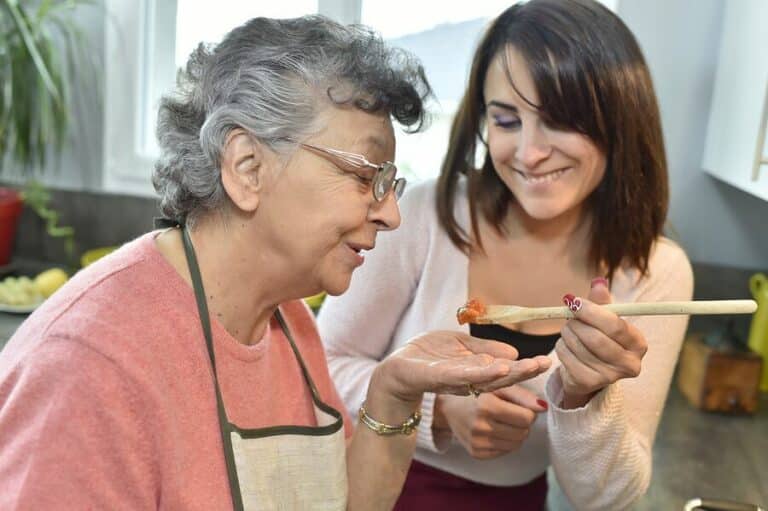Simplified Cooking for Senior Wellness: Personal Care at Home
Diet and nutrition play key roles in the health of seniors. Seniors that are living independently often don’t eat as healthy as they should. There are a variety of reasons why seniors who live alone don’t eat healthy meals such as the difficulty of cooking if they have health conditions, the difficulty of making meals for one person, or the difficulty of shopping for healthy ingredients.
Personal Care at Home can make a significant difference for seniors who are living alone. With Personal Care at Home, seniors are more likely to eat regular meals. And they’re more likely to eat healthy foods when they have help cooking and cleaning up after meals. Some expert tips that can help make cooking healthy meals easier for seniors who are living independently are:
Plan Meals In Advance
Seniors will find making healthy meals easier if they plan meals in advance. Create a weekly menu that includes a variety of foods from all food groups, such as fruits, vegetables, lean proteins, whole grains, and low-fat dairy. Planning ensures that you have the necessary ingredients on hand and helps you avoid making unhealthy last-minute choices.
Shop Smart
When grocery shopping, stick to your meal plan and choose nutrient-dense foods. Opt for fresh produce, lean cuts of meat, whole-grain products, and low-fat dairy. Try to avoid heavily processed and high-sugar items.
Manage Portions
Carrying excess weight puts additional strain on the circulatory system. Seniors who are overweight should get regular exercise and eat a health diet to try and lose weight. Seniors who are a healthy weight should do what they can to maintain that weight to avoid putting extra stress on their circulatory system.
Stay Hydrated
Dehydration can cause a lot of health problems for seniors, including hurting circulation. Seniors should be drinking at least 8 ounces of water most hours of the day. And they should be eating lots of leafy green vegetables which are healthy and have a high water content.
Incorporate Fibre
Focus on incorporating high-fibre foods like whole grains, legumes, and vegetables into your meals. Fibre aids digestion, helps maintain a healthy weight, and can reduce the risk of certain health conditions.
Invest in Kitchen Tools
Invest in kitchen tools that make meal preparation easier, such as ergonomic knives, utensils with larger grips, and non-slip cutting boards. These tools can reduce the risk of accidents and make cooking more manageable.
Cook in Batches
Prepare larger quantities of food and freeze individual portions for later use. This minimises the need to cook every day and ensures you have healthy options readily available.

Simplify Recipes When Necessary
Look for recipes that are easy to prepare and require minimal steps. Simple, one-pot dishes or slow-cooker recipes can save time and energy. Many cookbooks and websites offer easy-to-follow, healthy recipes for seniors.
Embrace Frozen and Pre-Cut Ingredients
Don’t hesitate to use frozen fruits and vegetables, as they can be just as nutritious as fresh ones. Pre-cut vegetables and fruits are convenient and can save time in the kitchen.
Use Herbs and Spices
Flavour your dishes with herbs and spices instead of excess salt and sugar. This not only enhances the taste of your meals but also reduces the risk of high blood pressure and other health issues associated with excessive salt intake. Incorporating Personal Care at Home into your cooking routine ensures a healthier lifestyle.
Balance Nutrients
Make sure your meals include a balance of carbohydrates, proteins, and healthy fats. This balance provides sustained energy and supports overall health.
Eat a Variety of Colours
A colourful plate often signifies a well-balanced and nutrient-rich meal. Try to include a variety of fruits and vegetables of different colours to ensure you get a broad range of vitamins and minerals.
Experiment with New Recipes
Don’t be afraid to try new recipes and experiment with different ingredients. This can make cooking more exciting and help you discover new healthy foods you enjoy.
Ask for Help!
If you have specific dietary restrictions or health concerns, consider consulting a registered dietitian. They can help you create a personalised meal plan that meets your unique needs.
If cooking becomes physically or cognitively challenging, ask for help from family members, friends, or get Personal Care at Home. Meal preparation assistance can make a significant difference in maintaining a nutritious diet. Personal Care at Home professionals can offer valuable support in ensuring seniors receive the nutrition they need.
Premiere Home Health and Senior Home Care services in Spruce Grove, Stony Plain, Devon, St. Albert, Edmonton, Onoway, Leduc, Parkland County and surrounding communities since 2016.
- Seeing Clearly: Glaucoma Awareness for Seniors - March 10, 2025
- The Sounds of Life: Hearing Aid Care for Seniors - March 3, 2025
- Save a Life Today!! ❤️ - February 18, 2025










